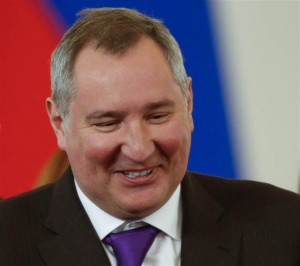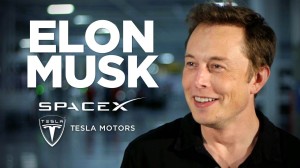redo Jump to...
print Print...
(by Justin Bachman, Businessweek) – SpaceX, the rocket and space exploration company founded by entrepreneur Elon Musk, filed a protest against the U.S. Air Force this week, saying that the military has unfairly prevented it from competing for space satellite launches.

Russian Deputy Prime Minister Dmitry Rogozin suggests that NASA “bring their astronauts to the International Space Station using a trampoline.”
The following day, Russia’s deputy prime minister, Dmitry Rogozin, who is targeted by U.S. sanctions over Ukraine, suggested that America may need to find a large trampoline to continue NASA’s access to the International Space Station [ISS]. Since President Obama allowed NASA’s space shuttle program to end in 2011, the U.S. pays Russia about $71 million per seat to fly U.S. astronauts to the station. The current ISS mission, Expedition 39, has two Americans among the six-person crew.
Musk knows a PR opportunity when he sees one. On Tuesday night, he tweeted:
In May 2012, SpaceX’s Falcon 9 rocket successfully sent the company’s Dragon spacecraft into orbit to dock with the International Space Station, which has been followed by subsequent trips to carry cargo to and from the ISS. The ISS crew will send cargo back to earth on May 18 aboard the Dragon. SpaceX plans its first Dragon test flight with humans as early as 2015. The final design is expected to carry seven astronauts to and from the ISS.

Elon Musk
Musk, also the founder of electric car maker Tesla Motors established SpaceX in 2002 as part of his broader mission to make other planets habitable by humans–a long-term goal, to say the least. But to fund its research into rockets and other technologies, the company relies largely on NASA for contracts to serve the ISS. The Pentagon’s routine launch of military satellites is another potential source of income and a catalyst for SpaceX’s recent legal action.
In its bid protest, filed April 28 at the U.S. Court of Federal Claims, SpaceX contends that the Air Force’s contract to purchase 35 rockets from the United Launch Alliance [ULA], a Boeing-Lockheed Martin joint venture, did not allow other bidders. SpaceX says each ULA space launch costs taxpayers $400 million, four times the price of its own launches and twice what other nations spend to launch their missions. “This legal action seeks to shine a spotlight on an issue that has gone unchecked since 2006, when the ULA monopoly was formed—the lack of competition in the national security launch market,” SpaceX said Tuesday in a blog posting.
 United Launch Alliance says its “block buy” contract with the Air Force saved taxpayers $4 billion and that it has successfully launched 81 consecutive missions for customers, including the Air Force, NASA, and the National Reconnaissance Office. The Centennial (Colorado) company said the launch contract involves “hundreds of suppliers” and would cost billions to cancel.
United Launch Alliance says its “block buy” contract with the Air Force saved taxpayers $4 billion and that it has successfully launched 81 consecutive missions for customers, including the Air Force, NASA, and the National Reconnaissance Office. The Centennial (Colorado) company said the launch contract involves “hundreds of suppliers” and would cost billions to cancel.
SpaceX also raised the current U.S.-Russian [argument] over Crimea as a potential further reason the Air Force should reconsider its contract with the Boeing-Lockheed Martin unit. From its website:
“The contract is made even more egregious in light of deteriorating US relations with Russia. The majority of EELV* launches are performed by ULA’s* Atlas family of launch vehicles, which use the RD-180 rocket engine. The RD-180 is made in Russia by NPO Energomash, which is owned and controlled by the Russian government. The Russian space and defense industries are led by Dmitry Rogozin, the Deputy Prime Minister of Russia. Rogozin is on the United States’ sanctions list as a result of Russia’s annexation of the Crimea. As the U.S. contemplates additional sanctions against the Russian defense sector, it is incongruous and damaging that ULA continues to send millions of dollars to Russian controlled entities to support U.S. national security. Given international events, this seems like the wrong time to send hundreds of millions of dollars to the Kremlin–especially considering there are domestic alternatives available and qualified to compete today that do not rely on components from countries that pose a national security risk.” (*for EELV and ULA info, see “Resources” below)
Musk appears ready to do his part for the new Chilly War.
Reprinted here for educational purposes only. May not be reproduced on other websites without permission from Bloomberg Businessweek. Visit the website at businessweek .com.)
Questions
1. a) Who is Dmitry Rogozin?
b) What threat did he make to the U.S. this week? Why?
2. a) How much does the U.S. government pay Russia to transport our astronauts to the ISS?
b) Why do we have to do this?
3. a) What is SpaceX founder Elon Musk’s ultimate goal for space?
b) How is he funding this goal?
4. SpaceX filed a protest against the U.S. Air Force, in which the company claims that the military has unfairly prevented it from competing for space satellite launches. How does SpaceX explain their complaint?
5. SpaceX also raised the current U.S.-Russian argument over Crimea as a potential further reason the Air Force should reconsider its contract with the Boeing-Lockheed Martin unit. Re-read the 2nd to last paragraph of the article from SpaceX’s website in which the company implies that the government would be better off using SpaceX to transport our astronauts to the ISS. What challenges does SpaceX still need to iron out before it would be able to take over this role?
6. For each of the following statements, write agree or disagree and explain your answers.
- President Obama shouldn’t impose any sanctions on Russia while our space program is at their mercy.
- The sanctions against Russia are too tough.
- The sanctions against Russia are not harsh enough.
- The sanctions against Russia are the perfect strategy – we have them right where we want them.
- The Russians are bluffing: they would not give up the money we pay them to transport our astronauts to space.
- Russia’s potential decision to stop transporting our astronauts illustrates exactly why the U.S. should not hand over control of any of our projects to another country.
- President Obama never should have let our space shuttle program end.
- Handing over NASA’s space program to private companies is the best/worst thing the Obama administration can do.
Background
- Russia, the U.S. and European countries signed an accord in 1993 guaranteeing Ukrainian territorial integrity as an incentive for Ukraine to give up its nuclear stockpiles. Ukraine complied. And we saw last month in Russia’s annexation [take over] of Ukraine’s Crimea how much stock the ex-KGB colonel [Putin] puts in written agreements.
- Obama has indicated he, along with less-enthusiastic European allies, will ratchet up sanctions until Russia complies.
- In the event of escalating sanctions, Russian diplomats promise a “tit for tat” exchange of punishments. Which might seem comical given Russia’s relatively small economic power. Except for one major thing:
- When the Cold War ended, Russian and American competitors turned to cooperation in manned exploration, building the International Space Station. It’s been manned…continuously now for more than a decade by rotating crews from the U.S., Russia, Europe and Japan. Russians and Americans take turns as ISS commander.
- Dmitry Rogozin is Putin’s Deputy Prime Minister overseeing defense and space programs. He’s also among Putin confidantes targeted [by the U.S./Obama administration] with asset freezes and travel bans.
- He warned…Tuesday that the latest sanctions on Russia’s science industry had the potential for also hurting Americans in space dependent on Russian technology and logistics for survival. “We warned them,” he said, “we will reply to statements with statements, to actions with actions.”
- Then, a defiant Rogozin added mockingly: “After analyzing the sanctions against our space industry, I suggest the U.S. deliver its astronauts to the ISS with a trampoline.” (from investorsbusinessdaily.com)
Resources
Read about the current ISS mission, Expedition 39 [pdf document]
United Launch Alliance (ULA), the Boeing-Lockheed Martin joint venture: ulalaunch.com
Evolved Expendable Launch Vehicle (EELV): wikipedia
Read “5 Reasons Obama won’t Push Harsher Russia Sanctions Yet” at businessweek.com.
Daily “Answers” emails are provided for Daily News Articles, Tuesday’s World Events and Friday’s News Quiz.



